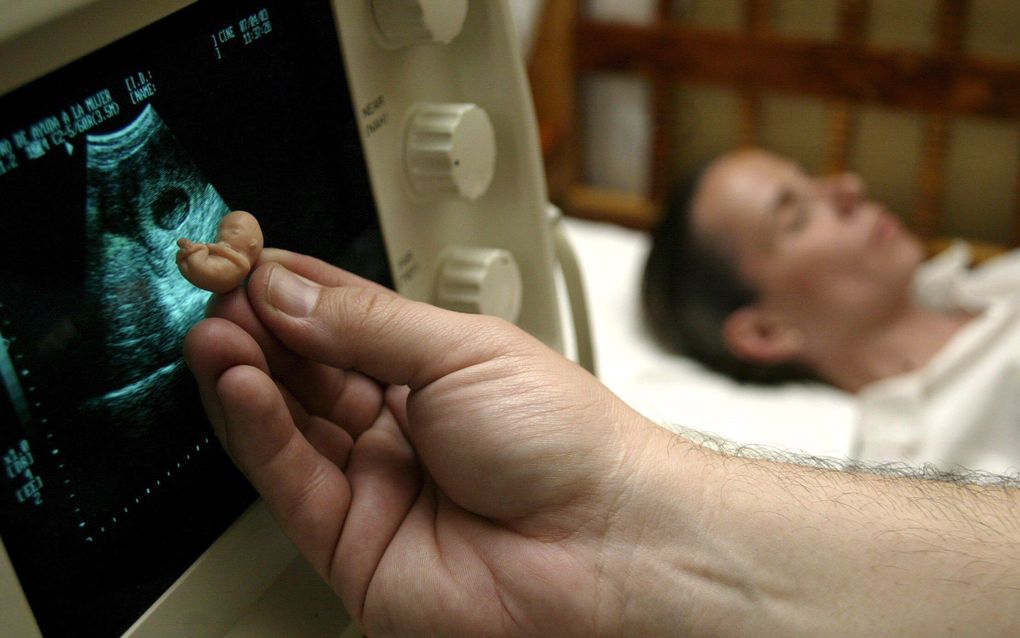Can a foetus feel the pain of an abortion? Some researchers think so

A woman undergoes a pregnancy ultrasound in Mexico. Photo EPA, Patricia Dominguez
European Union
It was the woman's ninth pregnancy. Serbian Dr. Stojan Adasevic grabbed his forceps, just as he did for the more than 48,000 abortions he performed.
It was the woman's ninth pregnancy. Serbian Dr. Stojan Adasevic grabbed his forceps, just as he did for the more than 48,000 abortions he performed. The National Right to Life report documented that the preborn baby neared its fourth month of development in Communist Serbia.
As he began dismembering what was inside, a hand and then a leg fell out and began to move. Later, he grabbed the heart, and it began beating slower and slower until he saw it lay motionless. That encounter left him with the pain that he harmed and killed a human being, something that had not occurred to him before.
Since the fall of Communism, a growing number of researchers have concluded that a foetus can sense pain not only around five months (approximately 28 weeks) but that it can be felt even earlier.
Setting Adasevic's experience aside, is it possible for a foetus to have the ability to sense pain, such as during an abortion procedure? Why is it the case that anaesthetics are now administered to a foetus before an in-utero operation begins?
The topic of foetal pain has been debated for decades and has remained a point of contention among gynaecologists and medical researchers. While some believe that the capability to feel pain begins at 28 weeks or even after birth, other medical professionals posit that sensing pain develops much earlier, at around twelve or even eight weeks.
Foetal pain in surgery
According to Dr Daniela Karall, new answers have emerged on foetal pain when performing surgeries in utero. Karall is a professor and neonatologist at the Department for Child and Adolescent Medicine at the Medical University of Innsbruck, Austria. She says that in particularly in premature babies, the ductus Botalli can remain open after birth and blood flows through it from the aorta into the pulmonary artery.
Sometimes, it can be closed with medication to establish an extra uterine circulation. However, if the closure with medication is not successful, she states, an operation is needed. These operations can occur as early as the 24-week mark.
Back in the 1970s and 1980s, we would give those babies only a relaxant; not any kind of anaesthesia, Karall notes, because of the perception, that at that age there was no perception of pain. However, during the operations, a raise in blood pressure and heart rate were noticed – a reaction to pain. No operation is nowadays performed in any premature baby without anaesthesia.
"We know for sure that premature infants as of 23 weeks feel pain. No neonatologist now would perform such a procedure without pain coverage."
She also gave the example of in-suction abortions or vacuum aspiration. Foetuses in the womb have been known to jerk back when they are poked or prodded by a medical instrument. Although it is said that this is a reflex, it can also be indicative that the foetus is experiencing pain.
Karall explains that, according to what researchers know now, any time a certain part of the body connects to a nervous tissue, there is the capacity to perceive pain.
What is pain?
But what exactly is pain, and how do we define it? The National Institutes of Health says that pain is defined as "an unpleasant sensory and emotional experience associated with or resembling that associated with actual or potential tissue damage." Social or biological factors can regulate it and come through individual life experiences over time. Although pain can be "adaptive," it can have detrimental effects on quality of life, they write.
Now, what can be said about the latest research on foetal pain? Some medical professionals conclude that a foetus can sense pain within different areas of the body, not only through the cortex as previously believed but through "functional thalamic connectivity" via the subplate, according to Dr. Stuart Derbyshire and Dr. John Brockman in the journal entitled Reconsidering Fetal Pain The authors say that this area cannot entirely rule out that a foetus can experience pain before 24 weeks.
Researcher Bridget Thill additionally points out that there's a possibility that a foetus can experience pain at as early as 12 weeks and through the thalamus as early as seven weeks gestation. Thill argues that the thalamus and brainstem, where pain and consciousness can be felt, start developing during the first trimester, as detailed in her journal by the Linacre Quarterly.
She also notes that anaesthesia and analgesia are being administered earlier, particularly within the second trimester (before 14 weeks gestation), to reduce pain and provide a good outcome. Thill points out that many anaesthesiologists recommend anaesthetics for preborn babies from the second trimester onwards.
RCOG
Yet, other medical professionals within the British-based Royal College of Obstetricians and Gynaecologists (RCOG) believe that the anatomy responsible for pain does not develop until 24 weeks. In their latest 2020 report, the RCOG states that pain cannot be possible before that time.
Where do the RCOG and others base their conclusions on? According to Thill, their estimation comes from a 2005 review study on the topic that the cortex is necessary for perceiving pain and the RCOG's latest report. Institutions such as the Society for Maternal-Fetal Medicine also rely on data that derive from research on post-lobotomy patients from the 1950s.
Some in the study "experienced indifference to pain," although the institution does admit that this data does not apply to a foetus as the experiences are "specific to the neonate," Thill explained in her journal. CNE contacted the RCOG for an interview, but a spokesperson was not available at the time of publication. However, the College released the following statement: "The RCOG fetal evidence review published in December 2022 considered the most recent, high-quality evidence on fetal awareness and concluded that the possibility of pain perception before 28 weeks of gestation is unlikely."
Different perspectives
In addition to the RCOG, Doctors for Choice in Ireland and Germany, as well as the Dutch Association of Abortion Specialists, were contacted for comment. CNE had also reached out to Abortuskliniek Amsterdam, the Bloemhoeve location, as this is where later-term abortions are performed. None of the institutions either responded or referred CNEs to national medical organisations.
Chris Develing, a policy adviser for the Dutch organisation NPV- Care for Life, calls on the RCOG and others to consider different perspectives:
"It's interesting that the major institutions speak with such confidence, knowing the medical field was wrong before about the starting point of pain in humans. Infants were operated on without analgesia until deep into the 1980's. Are we really going to make bold statements again, this time concerning the human foetus, while so much about its development is unknown?"
While the field of foetal pain is emerging, both Dr. Karall and Develing acknowledge that more research needs to be done, especially within the mainstream medical industry. "We have to be precautionary, because we clearly don't know. It's basically impossible to know precisely when a foetus can experience pain because we cannot communicate with them," Develing says.
He also mentions a Dutch neonatal surgeon, Monique Haak, who believes in giving anaesthetics to developing babies as early as 16 weeks before an in-utero operation. She has also observed that foetuses can react to stimuli, which has the potential to be a pain response, he explains.
"We have to go where the evidence leads us. Until we find the facts, we have to avoid the possibility of severe pain for unborn human beings. Whether that means administering pain meds or not doing the abortion altogether."
Biological and psychosocial
Develing also noted that some abortion doctors cut off the umbilical cord before an abortion. This can be considered asphyxiation since it cuts off oxygen and blood supply. He also points out that more evidence is needed if the foetus experiences pain after that procedure.
In another point of consideration, Karall mentioned the role of hormones and how they may relate to foetal pain. When a pregnant mother has high cortisol levels, these can be passed on to the foetus and can later cause a much lower threshold for anxiety and other health issues. Along with this, is the field of epigenetics and how a mother's emotional or physical pain can affect a child's future.
"Many biological processes are imprinted in pregnancy," she says. "We need to widen research and look at the issue of pain not only biologically but also psychosocially."
Last year, Chris Develing explored further into the topic of foetal pain and featured anaesthesiologist Paul Lieverse in an episode on the NPV podcast, The Podcast of your Life! (De Podcast van je Leven!). The episode is in Dutch but can be viewed with English subtitles.
Related Articles











